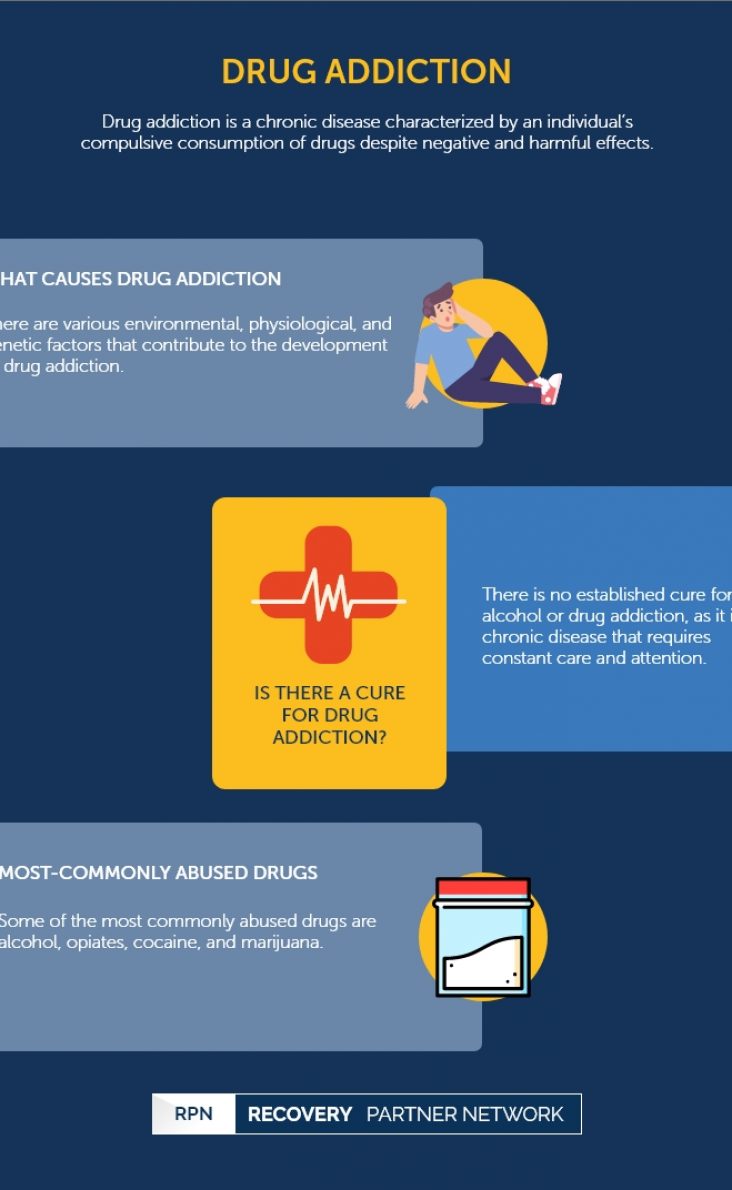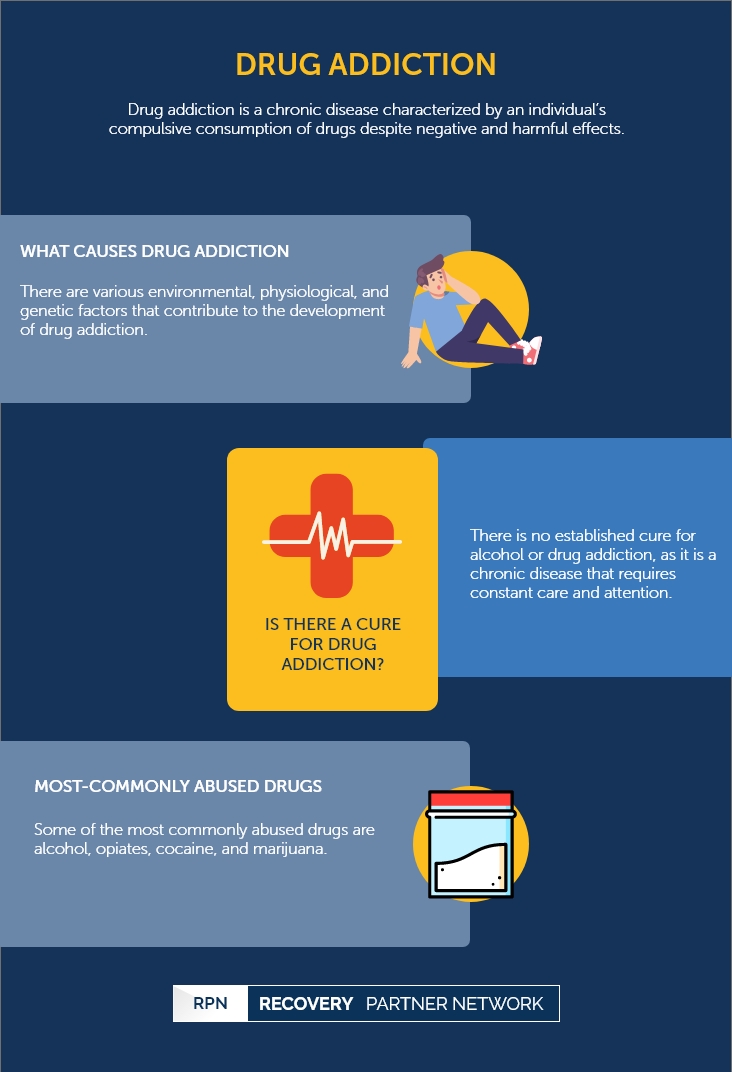Drug addiction is a chronic disease characterized by an individual’s compulsive consumption of drugs despite negative and harmful effects.
Drug Addiction
Drug addiction | Table of Contents
What is Drug Addiction?
Consumption of any drug (legal or illegal) over the limit, despite its adverse effects, can suggest a drug addiction. An addiction can cause physical and psychological dependence upon drugs.
Drug addiction is a disease that affects mental and physical components in our bodies. Studies have confirmed that substance abuse or dependence results in physical changes in brain function and activity and thus require a combination of treatments to overcome. Genetics also plays a role in addiction. Depending on genetics, one may be more susceptible than others to form an addiction. As more studies are performed, we are beginning to better understand how addictive substances function in the brain and create an insatiable desire for continued use despite the adverse effects and dire consequences.
It has been estimated that 23.5 million US citizens are currently struggling with some form of drug addiction, which is roughly equal to the overall population of Texas. Unfortunately, only 11% of those struggling with drug addiction seek medical treatment.
“Addiction is defined as a persistent, relapsing brain disease that is characterized by compulsive drug-seeking and uses despite harmful consequences.”
FAQ
Addiction is a chronic relapsing brain disorder that causes physical and psychological dependence on a substance or behavior. It is characterized by the compulsive use of a substance or practice of a behavior despite detrimental effects and consequences.
Addiction is defined as a disease by the American Medical Association and the American Society of Addiction Medicine.
An article published in the U.S. National Library of Medicine states that addiction genes can be inherited on a range from moderate to high. The higher the number of genes that cause vulnerability to addiction, the higher the person’s risk of forming an addiction.
What Causes Drug Addiction?
Environmental factors such as an individual’s belief/ spirituality, socio-economic status, abuse, stress, trauma, and even family/ friends may contribute to building unique circumstances in which a person may develop a drug addiction.
Addiction begins to develop when prolonged use of a drug alters the way the brain feels pleasure. Drugs are chemicals that can alter the way brain cells receive, send, and process information. These physical brain changes may remain in effect long after the drug has left the body.
This may be the most contentious conclusion to be drawn by scientists studying drug addiction. Nevertheless, research indicates that inherited genetic factors may delay or accelerate an individual’s addiction.
Physical signs of drug addiction:
- Ocular changes: bloodshot eyes or pupils larger or smaller than usual
- The unusual smell on breath, body, or clothing
- Tremors, slurred speech, or impaired co-ordination
- Lacking energy and motivation
Behavioral signs of drug addiction:
- Failure to fulfill obligations, such as work, family, or school responsibilities.
- Reducing social or recreational practices or trying to be isolated or withdrawn.
- Stealing, imprudent driving, and engaging in other risky behaviors.
- Spending money or borrowing money for drug use.
- Neglect of personal hygiene, appearance, or grooming.
Psychological indicators of drug addiction:
- A change in mood, temperament, or attitude.
- Exhibiting excessive hyperactivity, anxiety, or dizziness.
- Appearing lethargic or “spaced-out.”
- Appearing fearful, anxious, or paranoid without a reasonable explanation.
FAQ
- What are the contributing factors of addiction?
- How does drug abuse affect the brain?
- What are the signs of drug addiction?
- Which part of the brain is responsible for addiction?
Certain factors such as peer pressure, family history of addiction, lack of family involvement, the willingness to experiment with drugs, mental health disorder, and the use of drugs at a young age can significantly affect the likelihood of forming an addiction.
Drugs produce an increased level of dopamine in certain regions of the brain. The prolonged use of addictive substances causes changes in the way the brain naturally produces dopamine and forms a reliance on the dopamine produced by the substances instead. This physical and psychological dependence is the formation of addiction.
The most common signs of drug addiction may include the inability to stop using the drug despite repeated attempts, experiencing cravings and withdrawals when the effects of the drug wear off and requiring higher doses to achieve the desired effects.
Drug use can mainly affect the basal ganglia, extended amygdala, and the prefrontal cortex. Some drugs like opioids can affect the functioning of the brain stem.
Is There a Cure for Drug Addiction?
There is no established cure for alcohol addiction or drug addiction. Addiction is a chronic disease that requires constant care and attention. Patients will require a series of life-long treatments, including therapy, counseling, support groups, and medications, to control and manage this disease.
Addiction changes our brain and body functions due to the persistent use of addictive substances. Untreated addiction often includes other physical and mental health disorders that will require additional medical attention.
Most-Commonly Abused Drugs
- Alcohol
- Opiates
- Cocaine
- Marijuana (cannabis)
Side effects caused by drug addiction vary depending on the type of drug abused, duration of use, and the dose consumed. Individuals who abuse drugs may sometimes consume more than one drug at a time. This is called polydrug abuse. The intensified effects of polydrug abuse can lead to dangerous and even fatal intoxication.
Recovery Partner Network
We aim to educate and empower. If you feel our library of resources does not cover your specific need, reach out to us, and we would be happy to help.
STATISTICS
© Copyright 2026


